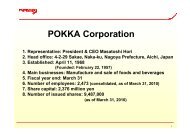Issue of Annual Report 2010
Issue of Annual Report 2010
Issue of Annual Report 2010
You also want an ePaper? Increase the reach of your titles
YUMPU automatically turns print PDFs into web optimized ePapers that Google loves.
Management’s Discussion and Analysis<br />
Sapporo Holdings Limited and the Sapporo Group<br />
The Group endeavored to initiate growth strategies and strengthen its<br />
existing businesses in accord with the key priorities <strong>of</strong> its rolling<br />
two-year plan, Sapporo Group Medium-term Management Plan <strong>2010</strong>–<br />
2011. This plan is based on the Sapporo Group’s New Management<br />
Framework unveiled in 2007.<br />
Our growth strategy involved various initiatives aimed at laying<br />
the groundwork for the future, including the following: We began constructing<br />
a brewery in Vietnam as part <strong>of</strong> our bid to enter the<br />
Vietnamese beer market; we entered into a business and capital<br />
alliance with Kyodo Milk Industry Co., Ltd.; and we entered into a beer<br />
industry business alliance with the South Korean Maeil Dairies Co.,<br />
Ltd. Meanwhile, to strengthen existing businesses, we pursued strategies<br />
that concentrated resources on certain brands and other areas<br />
<strong>of</strong> strength for our businesses.<br />
In terms <strong>of</strong> the scope <strong>of</strong> consolidation, the Company had 33<br />
consolidated subsidiaries and 6 equity-method affiliates in the year<br />
ended December 31, <strong>2010</strong>.<br />
Operational Overview<br />
In <strong>2010</strong>, the Japanese economy experienced a mild recovery from the<br />
outset <strong>of</strong> the year. But uncertainty over economic downturn amid a<br />
subsequent easing <strong>of</strong> the pace <strong>of</strong> global economic recovery and<br />
exports declining due to the yen appreciating resulted in ongoing<br />
weakness in consumer spending and downward pressure on prices.<br />
The industries in which the Sapporo Group operates were variously<br />
affected. The s<strong>of</strong>t drinks industry saw demand increase in<br />
response to record summer heat. In contrast, affected heavily by<br />
listless consumer spending, demand rose less than expected in the<br />
alcoholic beverage and restaurant industries. In the real estate industry,<br />
Greater Tokyo <strong>of</strong>fice vacancy rates appeared to bottom out during<br />
the latter half <strong>of</strong> the year, but <strong>of</strong>fice rent levels were in continual<br />
decline throughout the year.<br />
Consolidated Operating Results<br />
Net Sales<br />
Net sales increased ¥1,710 million, or 0.4%, year on year, to<br />
¥389,245 million.<br />
By business segment, Alcoholic Beverages saw a 0.4% year-onyear<br />
decline in net sales to ¥304,218 million. The Alcoholic<br />
Beverages (Japan) business saw an increase in unit sales <strong>of</strong> beer-type<br />
beverages. Yet, monetarily, net sales decreased as a consequence <strong>of</strong><br />
business growth in low-priced products. The Alcoholic Beverages<br />
(International) business, on the other hand, saw net sales increase as<br />
a result <strong>of</strong> continued strong sales performance in North America.<br />
The S<strong>of</strong>t Drinks segment saw a 12.0% year-on-year increase in<br />
net sales to ¥34,439 million, on solid sales performance spurred<br />
by an unusually hot summer, with sales remaining strong<br />
afterwards.<br />
The Restaurants segment recorded a 3.5% year-on-year decrease<br />
in net sales to ¥27,051 million. This was due to closing unpr<strong>of</strong>itable<br />
restaurants as part <strong>of</strong> earnings structure improvements.<br />
The Real Estate segment recorded a 1.2% year-on-year increase<br />
in net sales to ¥23,537 million. This reflected sales stabilizing and<br />
increasing as a result <strong>of</strong> efforts to maintain occupancy rates and rent<br />
levels on existing properties.<br />
Cost <strong>of</strong> Sales<br />
Cost <strong>of</strong> sales decreased ¥6,479 million, or 2.4%, year on year to<br />
¥261,212 million. The cost <strong>of</strong> sales ratio decreased 2.0 percentage<br />
points to 67.1%.<br />
This was mainly because sales increased while raw ingredient<br />
and materials costs and fixed manufacturing costs decreased.<br />
Selling, General and Administrative Expenses<br />
Selling, general and administrative (SG&A) expenses increased<br />
¥5,682 million, or 5.3%, year on year to ¥112,630 million.<br />
The main reasons were an increase in depreciation charges due<br />
to the launch <strong>of</strong> a new sales and logistics system in the Alcoholic<br />
Beverages (Japan) business and a combined increase in sales incentives<br />
and commissions accompanying sales increases in the S<strong>of</strong>t<br />
Drinks business.<br />
Operating Income<br />
Operating income increased ¥2,507 million, or 19.4%, year on year to<br />
¥15,403 million.<br />
The Alcoholic Beverages (Japan) business achieved operating<br />
income growth on the back <strong>of</strong> higher beer unit sales and production<br />
cost reductions. The Alcoholic Beverages (International) business<br />
achieved operating income growth thanks to increased unit sales in<br />
existing businesses, but upfront investment associated with its entry<br />
into Vietnam resulted in an overall pr<strong>of</strong>it decline.<br />
The S<strong>of</strong>t Drinks business posted sales growth and also achieved<br />
operating income growth as it continued to strengthen pr<strong>of</strong>itability.<br />
This enabled the business to fully absorb its upfront investment in<br />
food operations.<br />
Sales for the Restaurants business decreased from a slump in<br />
demand, as well as the closure <strong>of</strong> unpr<strong>of</strong>itable restaurants.<br />
Nevertheless, the business saw operating income grow from measures<br />
to rein in costs, such as negotiations to reduce rents and the<br />
closure <strong>of</strong> unpr<strong>of</strong>itable restaurants.<br />
The Real Estate business endeavored to cut costs, and to maintain<br />
occupancy rates and rent levels, and thus achieved operating<br />
income growth.<br />
Other Income (Expenses)<br />
Other income was ¥2,359 million, compared with other expenses <strong>of</strong><br />
¥4,022 million in the previous year.<br />
With regard to net financial income (expenses), calculated as the<br />
sum <strong>of</strong> interest and dividend income minus interest expense, the<br />
Company recorded expenses <strong>of</strong> ¥2,589 million in fiscal <strong>2010</strong>. This<br />
was a slight improvement on the previous year and in line with a<br />
decrease in financial liabilities.<br />
In equity in income <strong>of</strong> affiliates the Company recorded a 121.4%<br />
year-on-year increase to ¥611 million, with affiliates POKKA<br />
CORPORATION and Azumino Food Co., Ltd. contributing to this change.<br />
SAPPORO HOLDINGS LIMITED<br />
<strong>Annual</strong> <strong>Report</strong> <strong>2010</strong><br />
29



